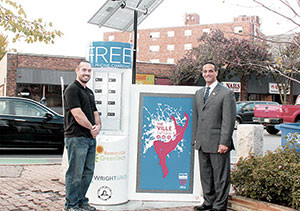
Mayor Curtatone shows off the city’s second Sustainaville/GreenTech pilot program solar powered charging station. — Photo courtesy of Sustainaville/GreenTech
By Haley ED Houseman
The United Nations Climate Change Conference in Paris is scheduled for December, but Somerville’s Mayor Curtatone has stepped up ahead of talks to offer his signature to the Compact of Mayors.
On October 15, the mayor joined the international coalition of cities engaged in climate action that was launched at last year’s UN Climate Summit, spanning all habitable continents and including 223 cities. This amounts a full 4% of total global population, committed to lowering emissions, encouraging sustainable investment, building data and supporting local action on community-based projects and initiatives. The mayor and Somerville’s Office of Sustainability and Environment (OSE) are “working to leverage our community goals, our stewardship” to create real change.
With climate issues at the forefront of international and national news, Mayor Curtatone is hoping advance “bold action in changing human behavior, world behavior,” not just preparedness for disaster. He sees climate change as the greatest threat to our health and our stability.
The mayor notes that cities are large-scale contributors of emissions, which is an opportunity to be at the forefront of action and stewardship. With the ambitious goal of carbon neutrality for Somerville by 2050 already in place, the city and the mayor had made their reduction commitments before joining the Compact of Mayors. The parameters already matched the coalition’s guidelines and were able to sign on without alterations of the existing 2050 plan.
If the goal seems ambitious, know that the city has been laying the groundwork since launching the Office of Sustainability and Environment in 2006. With an overall goal of improving environmental performance of the city, the office’s programming covers all kind waste recycling and disposal, as well Sustainaville program. It features a variety of pilot projects through innovative GreenTech programming as well as developing a Climate Change Plan Process.
The OSE acquired a new director last year, when Oliver Sellers Garcia was hired to head the department. He believes that embracing sustainability saves money and increases efficiency, and all approaches are on the table.
According to the mayor, cities are responsible for 70% of emissions, with denser populations and infrastructure development. In recent years the OSE has been oriented toward climate change priorities, examining the city’s greenhouse debt inventory, and conducting a climate change vulnerability assessment. The office is also working with community partners and stakeholders to advance its reduction goals.
In particular, the department is exploring the role of technological innovation, treating the city as “urban laboratory,” as Sellers Garcia explains. Somerville is leading the way, fostering technology and innovation. He adds that we can’t ignore the “less glamorous things, the nuts and bolts of reducing emissions.” There are plenty of challenges. “We live in old buildings – how do we get more solar?” He’s looking at long and short-term solutions that save both money and energy.
The mayor has noted the potential to expand OSE, with growth in the same vein as the city’s partnership with Honeywell International in a energy conservation and building modernization program. The program leveraged energy-efficient upgrades and renewable energy technologies to reduce utility costs and emissions by 20 percent, and reportedly save the city $2 million in energy costs. It is advances like these that the mayor calls “the boldest steps in innovation,” programs that the city will be investing in as they seek more private-sector partnerships.
It is not just a matter of infrastructure support; the city is also examining systemic problems such as the narrowness of our food system. Says Sellers Garcia, “The majority of our food comes through Chelsea. That’s not just a Chelsea problem, it affects all of us.”
The department is looking at ways to support and sustain its dense population, away from local food production. Transportation, infrastructure and urban agriculture are only pieces of the puzzle. Partnerships formed between cities, across jurisdiction lines, can help. The mayor recently joined the Metropolitan Area Planning Coalition’s Metro Mayors’ Coalition, focused on strengthening relationship between Greater Boston area cities. The coalition has passed a resolution outlining a “Climate Change Preparedness” Task Force and a commitment to addressing climate change issues.
The 2050 carbon neutrality policy is in line with the call the UN is making for an 80% reduction of emissions by 2050 in order to keep global warming below 2 degrees Celsius. Sellers Garcia admits that this is a “stretch goal” and notes that Somerville’s efforts are only a drop in the bucket if there’s not a global movement toward carbon neutral cities. But he’s optimistic about addressing a crucial need with finite, immediate change. “Let’s map out the different ways to get there – for 2017, for 2035, for 2050. We really want to demonstrate that changes are possible.”
The upcoming UN summit in Paris will be pivotal. The OSE director notes that the time is ripe to make a commitment to these kinds of programs. “The Paris talks are bringing an enormous amount of attention to what the Compact of Mayors is already working on.” In December’s UN talks, Mayor Curtatone is hoping for global approach, with actionable goals and standardized emissions evaluations, as well as a focus on building green technology. Most importantly, he is looking for “a true sense of alignment, of purpose, as one global community.”















Reader Comments